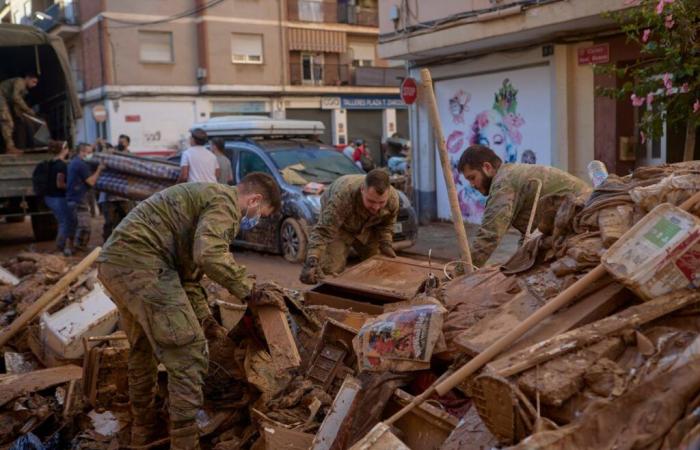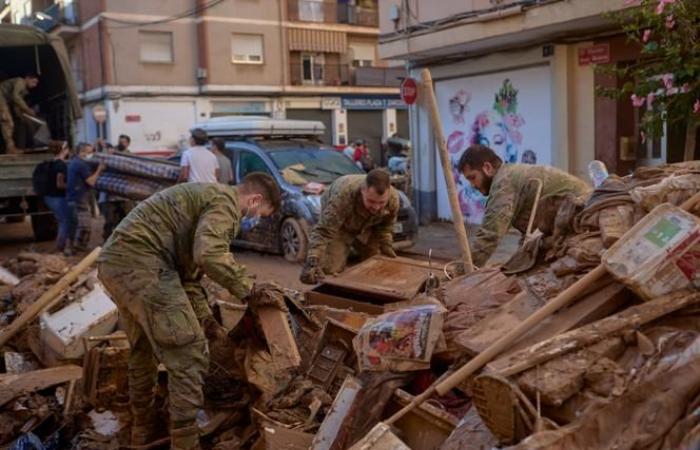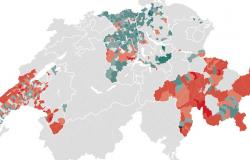King Felipe VI of Spain and his wife, Queen Letizia, arrived on Sunday November 3 at midday in Paiporta, near Valencia (east), one of the cities most bereaved by the tragic floods which ravaged the southeast of the country this week, as shown in images from national television (TVE).
Accompanied by Prime Minister Pedro Sanchez, the king and queen must then go to Chiva, another town near Valencia hard hit by this tragedy, which left at least 213 dead.
This visit comes as the Spanish meteorological agency (Aemet) has issued a new orange alert for heavy rains in the Valencia region, in particular in the Valencian metropolitan area and in the province of Castellon, where 100 liters of rain could occasionally fall. water per square meter (i.e. 10 cm). A red alert has also been issued for the province of Almeria, in Andalusia (south), due to “torrential rains” likely to cause flooding, according to Aemet, which recommends that residents only travel in the event of “strict necessity”.
Read also | Article reserved for our subscribers In Valencia, a multitude of volunteers are hard at work: “We come to help everyone, no one in particular”
Read later
On Saturday, Pedro Sanchez announced the sending of 5,000 additional soldiers to help the victims and participate in the search for the missing, bringing their total strength to 7,500, i.e. the “largest deployment of armed forces ever carried out in Spain in peacetime”according to him. To these soldiers will be added 5,000 police officers and civil guards responsible for supporting their 5,000 colleagues already on the ground, reinforcements impatiently awaited in certain localities facing a chaotic situation.
According to the latest report from the emergency services, released on Saturday evening, 213 people died due to the torrential rains which fell during the night from Tuesday to Wednesday. With 210 deaths, the Valencia region was hit hardest. Two people also died in the neighboring region of Castile-la-Mancha and one in Andalusia (south).
Searching car wrecks
According to Aemet, in certain localities the equivalent “from a year of precipitation” in a few hours. This deluge is linked to a “cold drop” phenomenon, an isolated depression at high altitude which causes sudden and extremely violent rains which sometimes last for several days. This meteorological phenomenon, quite common in autumn on the Spanish Mediterranean coast, is most likely worsened by global warming, according to scientists.
It is about “the greatest natural disaster in the recent history of our country”said Pedro Sanchez.
Authorities expect the toll to rise further as car wrecks piled up in tunnels and underground parking lots in the worst-hit areas are now methodically examined.
Read also | Article reserved for our subscribers After the floods in Spain, the slow and difficult search for the missing
Read later
If the chances of finding survivors are diminishing, the priority for relief remains the search for the missing, with the restoration of roads and infrastructure to allow the delivery of aid and the reestablishment of essential services. According to the authorities, more than 2,000 damaged cars and trucks have already been removed. Electricity has also been restored to 94% of residents who had been deprived of it.
Newsletter
“Human warmth”
How to face the climate challenge? Every week, our best articles on the subject
Register
Saturday evening, the conservative president of the Valencia region, Carlos Mazon, announced a battery of economic aid and promised the return of order, while acts of looting were reported in several stores, leading to arrests of 82 people. “There are people who may have felt alone, helpless, unprotected and I understand that”recognized the elected official. But “we will help all households” who need it, he said. “We are facing the challenge of our lives and we are going to find the solutions. »
The regional government of Valencia is the subject of criticism for having sent a telephone alert message to residents late on Tuesday, while the meteorological services had placed the region on red alert in the morning. Criticisms rejected by Carlos Mazon, who ensures he followed the protocol in force and who highlighted Saturday “the spirit of solidarity of the population” of his region in the face of adversity.







